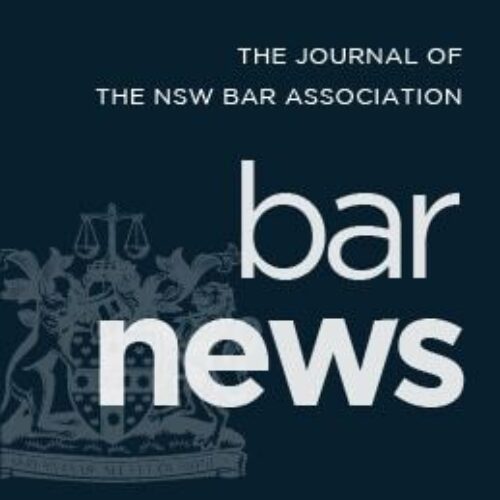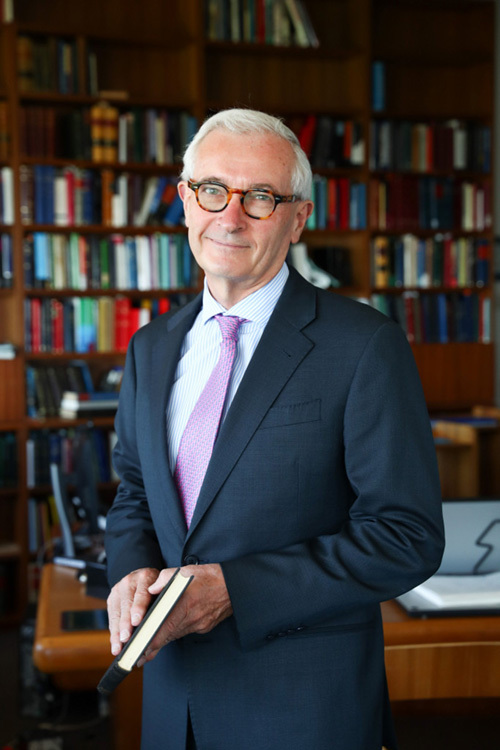- Winter 2023
- Retirement of Chief Justice James Allsop AC

6 April 2023 marked not only the end of James Allsop’s decade as Chief Justice of the Federal Court of Australia, but also 22 years of outstanding judicial service to the community. Almost five of those years were spent as President of the NSW Court of Appeal (after seven years on the Federal Court) and then, in the true tradition of cross-vesting, Allsop CJ returned to the Federal Court as its fourth Chief Justice. His appointment to that position surprised no one. Indeed, the late Justice Bryan Beaumont AO had long before prophesied that James Allsop would ultimately lead that court based upon the qualities he demonstrated as associate to Sir Nigel Bowen. Allsop CJ has faithfully and proudly carried on Sir Nigel’s legacy in leading a ‘national court of learning, intellectual rigour and civility in collegiate partnership with the great Supreme Courts of the country whose standards he wished to emulate’.
It is difficult to think of a more challenging leadership position in the Australian judicature than that of Chief Justice of the Federal Court. Having more than 50 judges and approximately 1200 registry staff spread across a country of this geographic enormity and in six different capital cities speaks for itself. It is tempting to use the idiom of herding cats but, in Allsop CJ’s case, a more appropriate expression is herding chooks. The challenges of the position are highlighted by the fact that, unlike other Chief Justiceships, the head of the Federal Court carries full responsibility for both the court’s trial and appellate functions and without the assistance, for example, of a President of the Court of Appeal or heads of trial jurisdictions.
Allsop CJ introduced and presided over a significant cultural and structural change within the Federal Court with the National Court Framework. Key features are the creation of eight distinct national practice areas and the publication of 28 national practice notes. These important reforms were designed to create a truly national court and reduce some of the state tribalism which had emerged previously. The triumph of the reforms was demonstrated when a chorus of judges from various registries sang as a team at Allsop CJ’s farewell dinner, including the line ‘glory, glory to James Allsop, your reasons will live on’. As Justice Kenny commented on the occasion of Allsop CJ’s public farewell from the Federal Court, these significant and successful reforms reflected both a ‘mission and leadership’ of the highest order.

Given the readership of Bar News it is desirable to say something about Allsop CJ’s dealings with the Bar during his judicial career. The first point must be the courtesy, civility and restraint which he displayed on the Bench and which he expected of the profession. These qualities reflect the importance he attaches to values of dignity and individual respect. Allsop CJ has emphasised the role of related values of fairness, reasonableness and justice in the framing of legal rules and in the exercise of power in a free society. In his words, ‘the recognition that these values inhere because the subject [of law] is about how power affects people – their rights, interests and expectations’. Indeed, as Allsop CJ has pointed out, these values inform how the law of bankruptcy should be understood, referring approvingly to the following observations of Deane J in Kleinwort Benson Australia Ltd v Crowle [1988] HCA 34; 165 CLR 71 at 82:
It is true that the strictness of the above rules leaves open the possibility of abuse by unscrupulous debtors. That is, however, an unavoidable concomitant of the protection of ordinary people faced with the threat of being made bankrupt. Many, and possibly most, of the petitions in the bankruptcy lists of this country seek the bankruptcy of honest, albeit unbusiness like or naive, people whose indebtedness springs from causes which evoke sympathy rather than indignation. For such people, bankruptcy does not represent a game to be played to the frustration of their creditors. It represents a pronouncement of failure and humiliation attended by the fear of unknown consequences and the susceptibility to criminal punishment for what would otherwise be innocent conduct.
Secondly, and perhaps, reflecting his earlier brief career as a high school teacher prior to returning to Sydney University to complete his law degree and win the University Medal, Allsop CJ took an active role in legal education. Shortly after he became President of the Court of Appeal he and her Excellency Margaret Beazley KC AC addressed the NSW Bar Association on two occasions in which they emphasised the need for appellate advocates to provide clear and thoughtful written submissions.
Allsop CJ’s significant contribution to legal education is also reflected in his extensive extra-curial publications, which include no less than nine contributions to Bar News, and a staggering 120 other articles and addresses. They cover the full gamut of legal subject matters, including the seminal paper he gave to the NSW Bar Association in 2003 on Federal Jurisdiction. That is a topic very close to his heart, as any judge of the Federal Court soon discovered if they were bold enough to find that the court lacked jurisdiction to deal with a matter, notwithstanding the breadth of the 1997 amendments to s 39B of the Judiciary Act 1903.
Thirdly, when the pandemic emerged, Allsop CJ moved swiftly to ensure that the work of the court could continue, with extensive use of information technology. This not only benefitted litigants but it also minimised the harm and hardship which might otherwise have been felt if legal practitioners could not access the court’s services.
It is difficult to understand the gossip columnist’s description of him many years ago as ‘Justice All-strop’. That’s not to deny that, like all of us, there are some moments when the composure and self-restraint lapses. Particularly so when those whom he has described as ‘our betters on the High Court’ have the temerity to overrule one of his judgments. Those few occasions could lead to what former Chief Justice Tom Bathurst described as one of Allsop CJ’s ‘legendary visits’:
They generally begin with you [Allsop CJ] appearing unexpectedly and silently in the doorway of chambers – often to the great surprise of the relevant Judge and their staff. You then immediately embark on an explanation of some unusual factual scenario or matter of high legal principle. Unfortunately you do not tend to preface these expositions with any form of context. The result is that the bemused judge often spends a very confusing few minutes working out if they sat on the case you are talking about or even what the conversation relates to. Once that has been figured out, your visits are always welcome.
Allsop CJ is renowned nationally and internationally as an intellectual powerhouse. He has made enduring contributions to jurisprudence, which reflects his commanding legal knowledge of so many areas of law. The major contributions he has made (in cases which are too many to mention) are in areas such as criminal law, contracts, negligence and, in the Federal Court, admiralty and maritime, insurance, corporations and commercial law, bankruptcy, immigration, native title, intellectual property and trade practices. His extraordinary legal scholarship and energy is also reflected in the number of academic positions he has held, which include his positions as Adjunct Professor of Law at the University of Sydney (where he taught a Masters Course in Comparative Admiralty and Maritime Law) and Adjunct Professor of Law at the University of Queensland (where he taught Admiralty Law). From 2005 to 2009 he was a Governor of the World Maritime University in Malmo, Sweden and from 2008 to 2011 he was a member of the Board of the Australian Maritime College.
Allsop CJ’s remarkable erudition and scholarship is reflected in his extensive personal library. His and his partner’s choice to retire to the Southern Highlands was substantially driven by the need for adequate space to house all those books.
Appointments to the High Court are affected by a wide range of known and unknown factors. Many people regretted that Sir Fredrick Jordan was never appointed to the High Court. The same applies to Allsop CJ. The High Court’s loss has been the Federal Court’s gain.
In conclusion, I cannot improve upon Attorney-General Mark Dreyfus KC’s tribute to Allsop CJ on the occasion of his farewell earlier this year when the reference was made that ‘your professionalism, your dedication and your commitment to the improvement of the justice system, Judiciary and the legal profession both within Australia and abroad, are a wonderful example for us all’. BN

